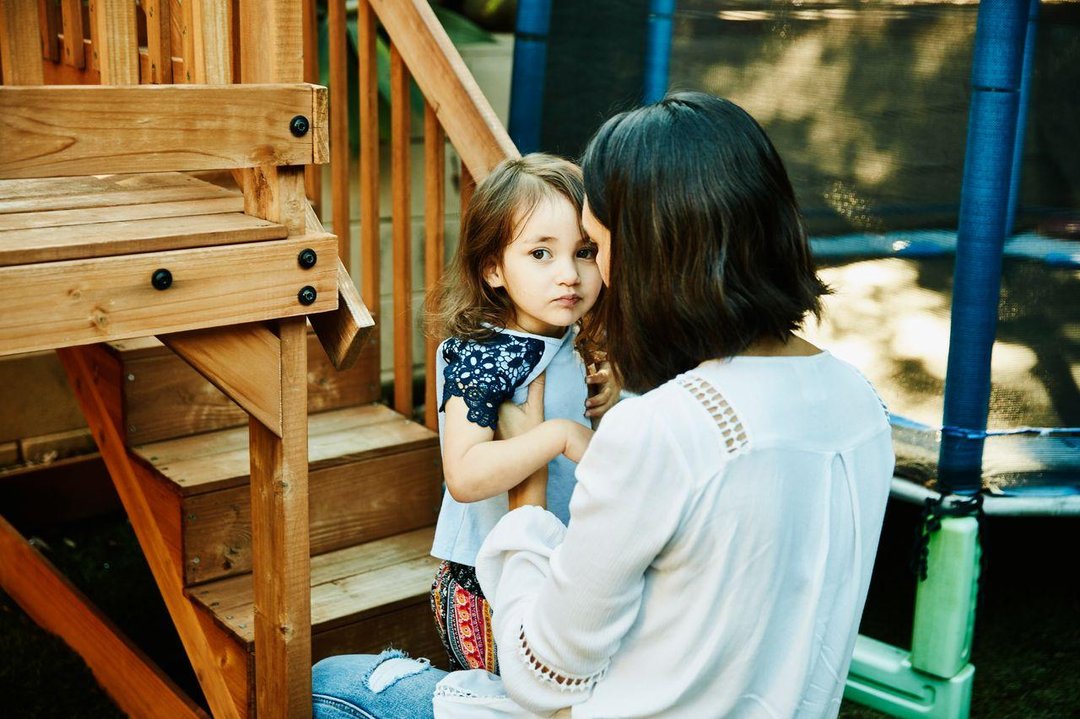
By Abigail Shrier
March 8, 2024
Hang around families with young children for an afternoon and you’ll hear parents checking that their kids are enjoying their ice cream, excited about school the next day, that they had fun at the park. So many questions are about their feelings in the moment. The signal to kids is clear: Your happiness is the ultimate goal; it’s what we’re all living for.
But we may have this backward, according to some research psychologists. If we want our kids to be happy, the last thing we should do is to communicate that happiness is the goal. The more vigorously we hunt happiness, the more likely we are to be disappointed, regardless of the conditions of our lives.

Our feelings are unreliable sources of information about what’s going right or wrong in our lives. THOMAS BARWICK/GETTY IMAGES
“We know that chasing positivity for yourself is actually associated with low psychological function—that it’s associated with more depressive symptoms,” Yulia Chentsova Dutton, head of the Culture and Emotions Lab at Georgetown University, explained to me. “Emotions are highly reactive to our attention to them. Certain kinds of attention to emotions, focus on emotions, can increase emotional distress.”
Therapists, teachers and parents in America all seem to proceed with the faith that emotion check-ins are as harmless and enlightening as sticking a thermometer under a kid’s tongue. But Chentsova Dutton, who studies emotional self-regulation among young people in the U.S., East Asia, West Africa and Russia, warns that encouraging kids, and especially struggling kids, to dwell on their feelings can actually be counterproductive.
Her research shows how malleable our emotions are, and how vulnerable they are to manipulation. This makes our feelings somewhat unreliable when it comes to diagnosing what’s going right or wrong in our lives. But we communicate the opposite when we ask kids to constantly examine how they feel. “We are basically telling them that this deeply imperfect signal is always valid, is always important to track…and then use it to guide your behavior, use it to guide how you act in a situation,” Chentsova Dutton said.
“Asking somebody ‘how are you feeling?’ is inducing negative feelings. You shouldn’t do that,” said Michael Linden, an expert in mood disorders and a professor of psychiatry at the Charité University Hospital in Berlin. Why? “Nobody feels great,” he explained. “Never, never ever. Sit in the bus and look at the people opposite from you. They don’t look happy. Happiness is not the emotion of the day.”
According to Linden, even a moment’s reflection about daily life reveals that a feeling of happiness is actually pretty rare. We spend much of our time simply “OK,” trying to ignore that we’re feeling a little tired, run down, upset, stressed out, irritated or in pain, straining to stay on task and manage our responsibilities.
By way of example, Linden interrupted our interview to ask me how I was feeling. I was inclined to say “good,” but he jumped in: “You don’t feel happy in this moment. You are concentrating on the interview.”
He was right. It was 5 a.m. in California when we spoke, and I am not a morning person. I was acutely aware that the three sleeping children one floor above me might, at any moment, wake and interrupt the interview. I hadn’t downed my morning coffee, and I disliked how tired I looked on my webcam. Linden looked relaxed in his merino wool sweater, but I was pale and exhausted, straining to seem sharper than I felt, struggling to catch his meaning through the sharp pickets of his accent. So not “happy,” no. Being more aware of, and precise about, my current feelings elicited primarily negative thoughts.
Studies have consistently shown that the more adults value happiness, the less happy they tend to be. A 2019 paper in the Journal of Applied Developmental Psychology similarly found that adolescents who agreed with the statement “even when I feel happy, I still wish I could be happier” were more likely to report symptoms of depression.
There are other problems with asking kids, over and over, to reflect on their feelings. This has to do with the relationship between our states of mind and our ability to tackle challenges.
Academic psychologists note that people who adopt an “action orientation” are able to focus on a task without getting distracted by thoughts about their current emotional or physical state. Those who adopt a “state orientation,” on the other hand, are thinking more about themselves in the moment: how prepared they feel, that crick blossoming in their neck, the email they forgot to answer. Unsurprisingly, an action orientation makes it much more likely that you actually accomplish the task.
“State-orientation keeps you from being successful in anything,” Linden said. No winning head coach asks his players to dwell on their feelings at halftime.
In fact, a raft of studies shows that people who fixate on how they feel moment to moment are not only less likely to complete tasks but also more likely to struggle with self-control, with higher rates of alcohol consumption and less success with dieting. In a study published in the Journal of Personality in 2020, participants who reported being able to put upsetting thoughts out of their heads were more likely to resume playing a popular computer game after an annoying interruption than those who admitted they tend to ruminate over their feelings.
Instead of constantly asking kids to name how they feel in the moment, adults should be telling kids how imperfect and unreliable their emotions can be. This means helping them recognize not only that their feelings of envy or indignation or infatuation rarely reflect a full and accurate picture of the world, but also that they sometimes deserve to be ignored.
A healthy emotional life involves a certain amount of repression. How is a child supposed to get through a day of school if she’s never learned to put aside her hurt feelings and concentrate on the lessons in front of her? How will she ever be a good friend if her own feelings are always front and center? How will she ever hope to function at work? She can’t. She won’t. They aren’t.
Instead of obsessing over the happiness of our kids, which pushes them to overvalue their own emotions, we can encourage them to set goals and take risks. The world outside of their own heads turns out to be a worthy distraction from the turbulent gloom of adolescence. It may also contain the cure.
This essay is adapted from Abigail Shrier’s new book, “Bad Therapy: Why the Kids Aren’t Growing Up,” published by Sentinel, an imprint of Penguin Random House.
Dow Jones & Company, Inc.



